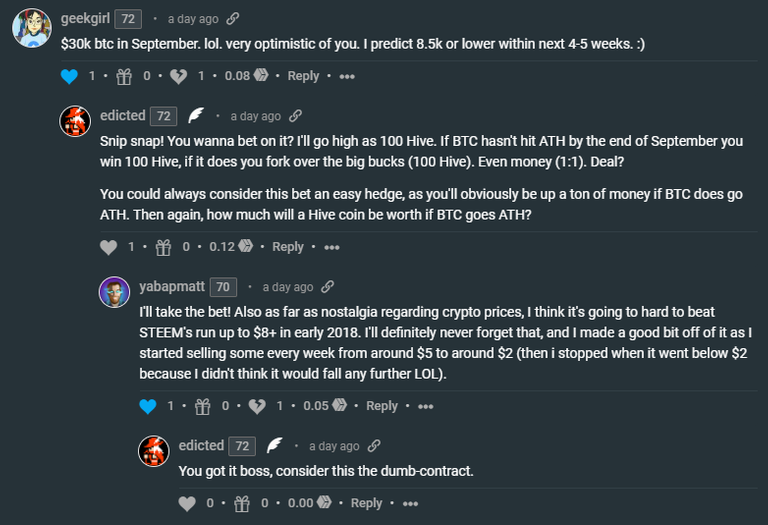Dumb-Contracts Continued: Put Your Money Where Your Mouth Is!

Yesterday I made a bet with @yabapmatt
- If BTC hits all time highs (ATH) by September I win.
- If not I lose.
- We are playing for 100 Hive 1:1 odds.
Is this a smart bet for me?
Nope! But I don't care!
Gamble gamble!
Technically, it is a great bet for @yabapmatt because if BTC does hit ATH he's theoretically up a ton of money and the 100 Hive doesn't matter. The bet acts as a hedge against the market, lowering his volatility. Meanwhile, I am increasing my volatility. Considering this space is already too volatile, adding more on top isn't a smart play.
But it is a fun play!
You can make this same argument for leveraged trading. You should never make a leveraged trade (borrowing money to buy more crypto) unless you are absolutely sure that the market is going to go up. How many of us can be absolutely sure of such a thing? Pretty much no one.
https://peakd.com/nostalgia/@geekgirl/re-edicted-qc36y9

More on dumb-contracts
https://peakd.com/contract/@edicted/dumb-contracts-steem-s-new-best-friend
Using custom-json and embedding JavaScript directly into our blocks, we can program any number of "dumb-contracts" that aren't enforced by witness consensus. However, they may be enforced by other methods.
I bring this up because I think dumb-contracts could actually compete with projects like Augur.

Augur
Back when I was just throwing money at any ICO that sounded like it might be cool, I found Augur and invested in it like so many other projects that ended up tanking in value. Augur is one of the first ICOs on Ethereum and a relatively old project. It does have its merit, but I think it is eventually doomed to fail.
Why's that?
It all comes down to friction within the economy. Not only does the creator of a bet on Augur pay a cost to make the bet and scrapes money off the top of bets that become active within the community, but also all Ethereum transactions have that annoying associated gas fee. I believe the future of crypto gambling hinges on Zero Friction Gambling Dapps, therefore projects like Augur can not compete in the long run, but Hive certainly can. We can win the Race To The Bottom.

By creating peer-to-peer services that give both betting parties even odds and zero rake (meaning they will likely break even on average rather than constantly lose money to a centralized agency) we can attract quite a few gamblers to the platform.
What does that look like?
Take the case above, where we are betting on if Bitcoin hits ATH or not by September 30. Who decides what ATH is (slightly different on every exchange)? What timezone are we talking about? What happens if one part doesn't pay up?
How can we enforce this?
The first way is something I've been talking about recently: escrow.
Using escrow smart-contracts, I could send 100 Hive to @yapabmatt in an escrow contract, and he could send me 100 Hive in a separate escrow contract. If either one of us tried to cheat we could dispute the escrow and bring in the arbiter to make the final decision. This solution is foolproof as long as the arbiter is reliable. Unfortunately, it only works for bets two users make with each other and doesn't work for betting pools with multiple players.
The second way is with Governance Voting.
Imagine creating a token for the purpose of governance. If the bets were made using this governance token, it does not have to obey Hive's consensus and can forge its own. In the event that the loser tried to back out of the bet after it was too late to do so, the winner could dispute this action. This dispute would trigger a community-wide governance vote, where anyone with governance tokens could vote for the side they believed to be the winner/loser. Whichever side had the most votes would win the consensus battle.
So imagine this bet with @yabapmatt in this context. I lose the bet and try to back out and not pay the price. A governance vote is triggered. If the vote sides with the obvious winner, no problem. However, if the vote is corrupted and sides with me, we have a problem. I believe we'd have to fix a problem like this by forking the network and destroying all the stake of the bad actors. Sound familiar? This is exactly why no one has any incentive to cheat the system in the first place. They put their own money at risk.

The third way is smart-contracts.
This is obviously the preferred way, but also the hardest to achieve involving the most work. When it comes to betting, often times it is impossible for the network to definitively know who the winner is without a trusted arbiter. If that's the case then we're back at solution #2 with governance voting (or choosing a different source for truth).
There are also shortcuts one can take, like using HiveEngine. This obviously also has its own centralized attack vectors but for the most part it surely can be trusted (especially if the bets are kept low enough to never justify cheating).
Conclusion
@yabapmatt is simply trusting me to honor the terms of the bet. In fact he's already stated that he's a busy guy and will probably forget about it, so if I lose I could just say nothing and get away with it. I obviously won't do that (or I would have never written this post in the first place).
However, the future of Hive looks a lot different than it does today. I fully expect sometime soon™ that features like this will be built straight into the platform and making a bet like this would be just as easy as talking about it in the comments. The resulting betting action would largely be automated and trustworthy.
Gambling is a really big deal when it comes to crypto. Crypto is impossible to regulate and gambling is a heavily regulated industry. The results of this dynamic going forward will have far-reaching consequences. There's a reason why you can play chess for free online but poker and casino games are heavily taxed, and let me tell you, the reason is not a good one. Time to flip this industry on its ear and see what happens.
Now I see why Tron is home to gambling dapps.....for now anyway
Indeed, the best way to hit them where it hurts is to provide gambling opportunities that don't take a rake for a centralized agent.
I've been thinking about escrow a bit. Some bigger players have wanted to do Splinterlands card trades with each other while avoiding the market fee; and asked me to hold the funds.
I run a guild, #roaringtwenties, where each member buys their seat, for 100K DEC ($80 approx)
I find myself wondering if there's a simple way for members to offer up their seat as collateral in a deal; up to the value of $80.
Send me the card, then I'll send you the 50 Hive for it. If I don't send the Hive, and refuse to return the card, I authorise Matt to kick me out of the guild without a refund.
If someone doesn't pay up the other party should be able to call in the escrow account to settle the dispute. Your collateral idea could work well as a backup in case the escrow account used was corrupt.
Yeah, I don't want to be called in to mediate disputes; but then how often would that actually happen?
I was thinking about that, and you could set it up so the escrow fee you charge only kicks in if there is a dispute. So basically you could jack up the escrow fee really high and then refund 100% of it when the deal goes through, and if someone tries to cheat you get paid a good amount to step in.
There are other ways to play it as well, like charging everyone a very low escrow fee (like a penny or less) or even just blacklisting people that try to cheat after the first strike.